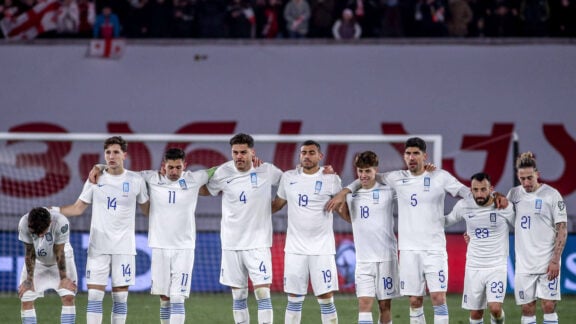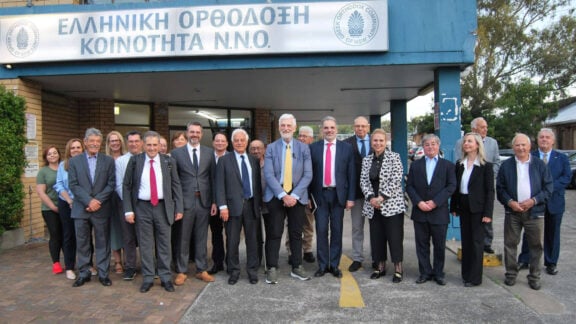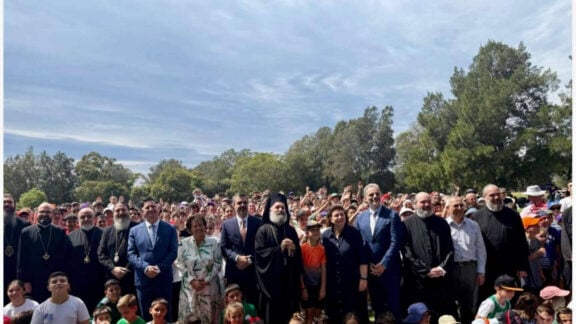“If we don’t speak Greek to our children, then our children may not speak Greek, and our grandchildren certainly will not speak Greek!”
These sentiments formed the introductory remarks of the President of the Pharos Alliance, Professor Emeritus Joe Lo Bianco, during the third Pharos seminar for parents last Sunday at the Greek Centre.
The seminar, which the Pharos Alliance President facilitated, was titled ‘Language in the Home: Raising Greek English Bilinguals in Melbourne’.
It focused on ways to support children to use the Greek language in the home, arguing it is insufficient for students to just learn to read and write Greek at school (even though it is still of vital importance).
The seminar elaborated on its central view that the continuation of the language depends on its daily use in the community, which starts in the family unit.
Pharos committee members met parents and grandparents who wanted to learn more about the objectives of the Pharos Alliance, with participants sharing their concerns and receiving invaluable advice, drawn from evidence-based research, to overcome obstacles.
They were provided with a variety of resources for the acquisition of vocabulary to help to create confident users of the language.
Jana Dostal, of Czech background, attended Greek lessons for adults at the Greek Centre for five years, and today her Greek is very good.
She speaks Czech to their daughter, Sophia, since there is there is only one Czech School in Melbourne (North Melbourne) which operates only fortnightly and serves a small number of students.
Her husband, Evan Psaros, who speaks Greek with Sophia, noted: “We want the languages to be maintained. For us, language is part of maintaining our identity. Compared to Greek, Czech is far less institutionally supported in Victoria, which is why we rely more on our own efforts at home for Czech.”
Dostal added that Greek school is essential because it provides a wider spectrum of resources and a wider vocabulary for their daughter than they are able to offer her, given that their language repertoire is relatively limited, having both been born in Australia.
“The effort and long-term commitment of parents is certainly necessary,” said Psaros.
“I think that the main reason some parents fail to help their children to learn Greek is because, to a large degree, they don’t want to do the work, they don’t want to get tired. They don’t try hard enough.”

Tasos and Elena Karphoglou, who also participated in the seminar, agree. They noted that at home, one of them always speaks Greek with their daughter, Electra, and they read books or watch films and listen to Greek music on a daily basis.
“The most important thing, though, is that she goes to Greek school every week without fail. We are committed to that. At Greek school, she learns vocabulary of a higher register than we use with her,” said Elena Karphoglou.
“Recently, when my daughter returned from Greek school, she asked me: Look mum, am I doing it ‘exceptionally well’? I didn’t teach her how to say this.
“Also, we try to go to Greece every year and we are there during the school term, making sure that Electra is enrolled in a Greek public school for one to two months. That helps a lot.”
Tasos Karphoglou added that “when she returns to Melbourne, I speak to her in English and she responds to me in Greek”.
Vasso Zangalis, Treasurer of the Pharos Alliance, does the same thing with her children.
She shared her family’s experience. In a mixed marriage, Vasso has not only sent her children for a period of time to a school in Greece, but she insists on speaking only Greek with them.
“If they don’t tell me in Greek what they want, they won’t get it. It’s that simple!” she said.
Martha Stamatopoulos, a NUGAS representative studying a Bachelor of Design (Architecture) at the University of Melbourne, expressed her pleasure that she was made to learn Greek during her school years.
“For me, Greek school was a given. It was never posed as a question, whether or not I would go, and luckily so, because it was ‘a whole other world’. It was a world in which I learned the language of my grandparents through lessons about culture and history,” she said.
“It was a space in which I enjoyed myself, in a very warm and safe environment, where I developed genuine friendships, better friendships than those at English school. I’m connected to these friends even today.”
At the seminar, among other things, participants had the opportunity to complete an exercise titled “language portrait”, where they explored the roles that languages play in the formation of their identities, demonstrating the link between psychology and language use.
Fostering the desire for children to identify as speakers of Greek, from a very young age, was a central goal of the seminar.
Professor Lo Bianco also emphasised the need to develop creative and enjoyable activities making use of relevant vocabulary to give children the tools to express themselves in Greek.
Communication exclusively in Greek with relatives (e.g. grandparents or cousins in Greece) could be utilised for this purpose.
Participants were guided to create a “language policy for the home” or a “contract” along with their children and were encouraged by the numerous examples of successful language revitalisation projects around the world, including those of the Welsh and Hawaiian languages.
“With persistence, it is possible for us to reverse the decline of Greek language use in Melbourne and Australia. The Pharos Alliance looks forward to this challenge and we invite all interested members of the public to join our efforts,” said Professor Joe Lo Bianco.









